“Youth is not a time of life; it is a state of mind”
The Birmingham Boys Choir is on tour in Japan this week. Among their pieces is a specially arranged version of the poem “Youth” by Samuel Ullman (1840-1924).

BBC singers heading to the concert hall in downtown Chiba on Saturday evening
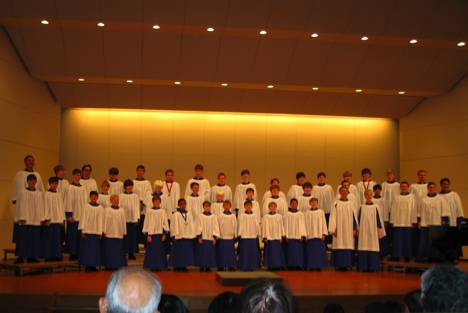
About to take a bow at the Chiba City Cultural Center (6/13/09)
Ullman’s story is a remarkable one. Jewish . . . German immigrant to Mississippi and, later, Alabama . . . Confederate soldier . . . businessman . . . father of six . . . advocate for laborers, women, and children . . . instrumental in the establishment of a high school for black children in Birmingham . . . lay rabbi . . . poet . . . This biographical sketch gives some of the broad brush strokes of that life story.
Ullman’s poem “Youth” has a story all its own. “Youth” was introduced among Japanese postwar leaders because of General Douglas MacArthur’s apparent love for it. The poem hung in his office in Japan along with pictures of George Washington and Abraham Lincoln, and MacArthur evidently introduced it to many Japanese who were instrumental in the rebuilding of Japan. This commemoration to Akio Morita of Sony (related to his contributions to the Samuel Ullman Museum) gives some idea of the poem’s personal significance to business leaders such as Morita, and why it is said to be included in “the top 5 texts loved by corporate management in Japan.”
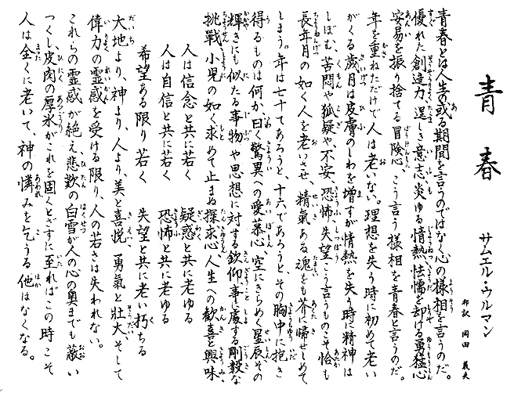
“Seishun” (“Youth”), by Samuel Ullman, translation by Yoshio Okada
Here are links to several Japanese versions of “Youth,” followed by the original English version:
3 well-known translations in print (with commentary on history of its translation)
Translation by Masa Shimamura (private version that is faithful to the original)
“YOUTH”
Samuel Ullman
Youth is not a time of life; it is a state of mind; it is not a matter of rosy cheeks, red lips and supple knees; it is a matter of the will, a quality of the imagination, a vigor of the emotions; it is the freshness of the deep springs of life.
Youth means a temperamental predominance of courage over timidity of the appetite, for adventure over the love of ease. This often exists in a man of sixty more than a boy of twenty. Nobody grows old merely by a number of years. We grow old by deserting our ideals.
Years may wrinkle the skin, but to give up enthusiasm wrinkles the soul. Worry, fear, self-distrust bows the heart and turns the spirit back to dust.
Whether sixty or sixteen, there is in every human being’s heart the lure of wonder, the unfailing child-like appetite of what’s next, and the joy of the game of living. In the center of your heart and my heart there is a wireless station; so long as it receives messages of beauty, hope, cheer, courage and power from men and from the infinite, so long are you young.
When the aerials are down, and your spirit is covered with snows of cynicism and the ice of pessimism, then you are grown old, even at twenty, but as long as your aerials are up, to catch the waves of optimism, there is hope you may die young at eighty.
—
If you would like to read more about Samuel Ullman and this poem, you might try Margaret E. Armbrester’s biography: Samuel Ullman and “Youth”: The Life, the Legacy(Amazon).
 RSS - Posts
RSS - Posts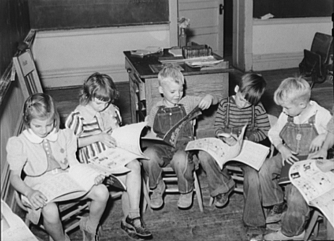
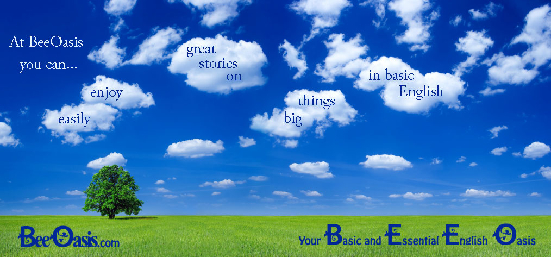
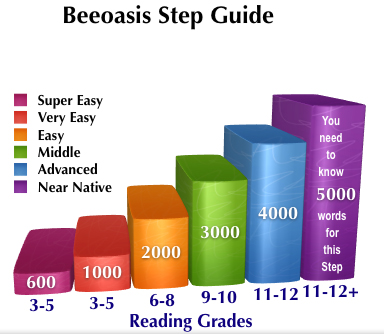
Zawa 5:05 pm on June 15, 2009 Permalink |
Sounds very interesting… 🙂
Mike Wilhelm 12:22 am on June 18, 2009 Permalink |
I like that poem. That is the first time I had read it.
nathaiel adap 8:43 pm on July 22, 2009 Permalink |
BEFORE MY FATHER DIED , THIS WAS THE POEM E WAS RECITING
Karyn 10:38 pm on October 12, 2009 Permalink |
Thanks for bringing this poem to my attention. I hope you will find time to give us some more posts!
sad emo and Love poems 10:51 am on March 23, 2010 Permalink |
I love this poem.This was recited on my class in English 3.Love this.
Anonymous 11:30 pm on April 3, 2010 Permalink |
During my college days.. we had a speech choir and we used this poem. Very Nice!